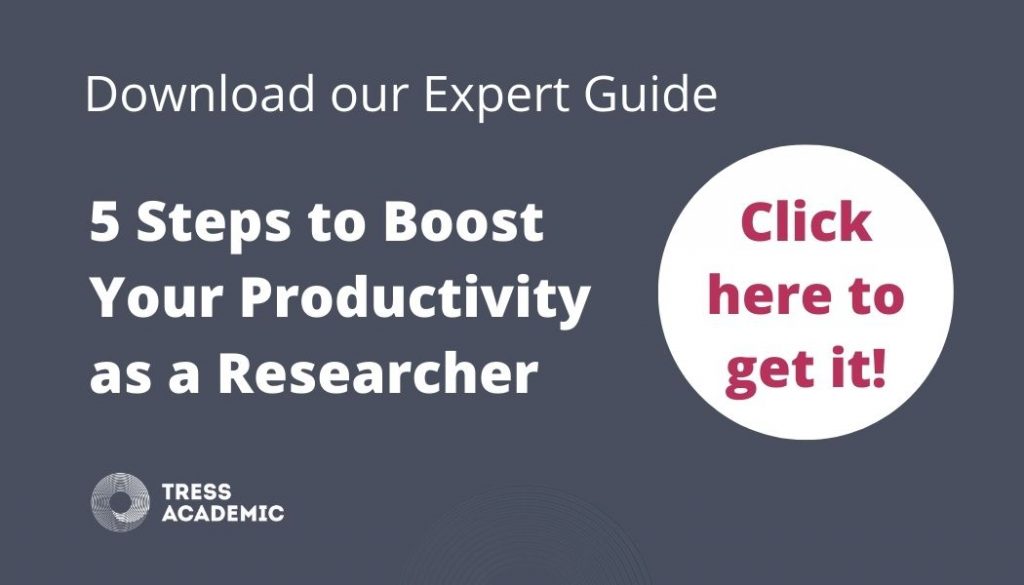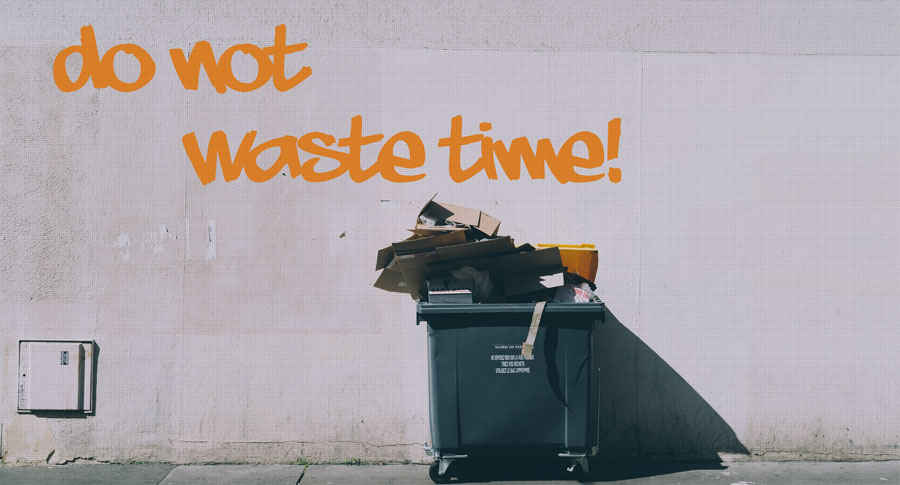Do you feel that some of your time is wasted with pointless activities? Wishing you could make better use of your working hours to move your research and your career forward? Here, we discuss the most common time-wasters for researchers, and suggest some tips to reclaim precious time.
The day has 24h and it’s the same for all of us. It’s how we spend those hours that makes the difference. Often we don’t achieve as much as we would like to because we’re disturbed by others or we’re subconsciously (or even deliberately) disturbing ourselves. In short: We’re wasting our time with activities that don’t make a meaningful contribution to our goals or daily tasks.
When we realise that we can work on something meaningful or make progress towards a set goal, happiness and motivation often increase. But when we feel that time is wasted, we get irritated and dissatisfied, and our motivation dwindles.
With this blogpost we aim to make you aware of work habits or activities that steal your time – activities which feel like drain holes for your energy or bite huge chunks out of your time deposit. Time wasters cost time that you could better invest in other activities.
Becoming aware of what or who is wasting your time is the first step in stopping bad habits and making more deliberate choices regarding how you spend your time. See for yourself if any of the time wasters mentioned below sound familiar. In our free worksheet ‘How to battle time-wasters’, we tell you how to overcome them and reclaim valuable time.
What is a time-waster?
A time-waster is someone or something that causes you to waste time unnecessarily on tasks which do not produce an important or beneficial outcome (see Collins-Online-Dictionary, Cambridge-Online-Dictionary). A time-waster can be an activity as well as a person. And if it’s a person, it can be yourself as well as someone else.
In my courses ‘Completing your PhD successfully on time’ and ‘How to become a more efficient researcher’ I always ask the participating PhD candidates for their most common time-wasters. This is how, over the years, I have been able to get a good insight into the most serious time-wasters of researchers. The list of typical time-wasters is not very long, rather, it is just a few time-wasters, who come up over and over again. These few are seriously stealing time from almost everyone. If you zoom out – away from the individual researcher to the research community in general – this is a gigantic loss of time that could be spent on much more meaningful activities, which would result in faster progress towards solving urgent societal, medical, technical or environmental problems.
Browse through the list of top time-wasters of researchers below – I bet some sound familiar to you. If you realise that you too are wasting time, download our free worksheet ‘How to battle time-wasters’, in which we tell you how to reclaim precious hours instantly.
The relevance of some time-wasters may have shifted due to Covid-19 and the resulting changes in our academic work-environment. While time-wasting due to use of the internet and social-media has likely gone up, time wasted in meetings e.g., might have been reduced.
1. E-mails
Are you finding yourself in the middle of working on something, just pausing for a split second and then intuitively checking for new e-mails? Clicking on the next best one and finding yourself writing a lengthy reply that takes you miles away from your original task?
One of my course participants reported no less than 86 interruptions in one single workday due to e-mail checking. That equals more than 10 interruptions per hour, and if these were equally distributed, it would amount to an interruption every 6 minutes.
E-mail is a great way to communicate. But compulsive and pointless checking of e-mails, as well as writing spontaneous responses while you are working on something else is a massive waste of your time. You can avoid this by re-thinking your habits and establishing a healthy work routine. Here is how to avoid this time-waster in a few simple steps.
2. Social media
Do you subconsciously pick up your mobile phone while working to just quickly catch up with the latest tweets from colleagues or posts on LinkedIn or Facebook? Or do you check every notification about a new post although you know you should be reading that research paper?
Social media is a great way to engage with the wider research community and to keep each other up to date with the latest developments. But clearly there is a difference between using social media to spread and absorb meaningful news and letting yourself get distracted by constant alerts and messages.
Get our free worksheet for tips to cut time on social media while staying afloat with relevant news.
3. Browsing internet without direction
I guess we’re all familiar with this: You just wanted to look up a reference, or double-check something on wikipedia, but promptly clicked on the blinking advert for the pair of trainers you searched for online a few days ago. Now you find yourself on the online shopping platform, trying to decide if you should still buy them or not.
I don’t have to emphasize the blessings of the internet, but we all know that google is not a charity, and sellers have become pretty clever at grabbing your attention and taking it away from what you are supposed to do. You have to be very intentional when it comes to staying on track with a particular online search. For more tips on how to avoid wasting time on the internet, see our free worksheet ‘How to battle time-wasters’.

4. Meetings
Are you participating in departmental meetings or project meetings that run overly long? Is the discussion going around in circles with the same issues being dwelled upon over and over again? Or is your supervisor organising 2 1/2h long lab meetings every week, where everyone takes a turn mentioning what they did over the past days? Resulting in one person being engaged and 10 others bored? PhD candidates and ECRs often report that they feel the meetings they participate in have little to do with their day-to-day work. There are many points on the agenda that are not of concern to them, and they are not allowed to participate in the decision-making-process anyway. So just sitting there and listening feels like a waste of time.
There’s no question that a certain amount of interaction and meeting is necessary to keep a scientific institute up and running. But there is a huge difference between well-organised, short and efficient meetings and those that don’t add value overall.
While the amount of meetings may have been temporarily reduced due to COVID-19 and home-working, prepare yourself with our tips for them once everyone is back at the institute.
5. Interruptions from other people
Is your new MSc student coming in to ask you a question every 20 min and you feel compelled to answer? Or do you have a nice colleague next door, who’s popping in regularly to share the latest institutional gossip with you? It might even be your supervisor dropping by spontaneously while you are in the middle of something else – just because she has time right now.
We all value informal social interaction in the academic environment. But if you are regularly disturbed or interrupted for overly long spells, something positive turns into a time-waster. If you are distracted from what you were working on, you’re losing focus and once the intruder has left, you have to pick up your thoughts again.
When you work in home-office, you may be interrupted by your home-schooling kids, your partner, or your flat-mates – but no matter who it is, it still costs time and distracts from the task at hand.
For tips on how to deal with interruptions, see our free worksheet ‘How to battle time-wasters’.

6. Shared office
PhD candidates or postdocs rarely have an office to themselves. Many feel distracted by the background noise of people coming in and out, the constant chatter of office mates, and the unmuted mobile phones and other devices transmitting noise. It’s difficult to try and find the bug in your code while constantly being distracted by the surrounding chatter. Not being able to concentrate on your work is stressful and wastes time.
To arrange for smoother co-working with several people we suggest you make a few basic agreements – see our free worksheet ‘How to battle time-wasters’.
7. Procrastination
Do you have the best intentions to work on something really important (e.g. writing on a paper) right at the start of the workday, but then find yourself removing the dust on your computer screen, after which you sort the stack of papers on your desk? You then re-order the books on your shelf, discover that some were due to be returned to the library soon, so you decide to quickly walk there and drop them, because a bit of fresh air would certainly help you to start your important task right afterwards. But then you decided to get a cup of coffee on your way back, where you meet a colleague you haven’t seen for a while …
Most of us are familiar with the perils of procrastination, which is wide-spread among scientists. Procrastinators postpone important tasks instead of tackling them head-on. When important tasks are postponed over and over again, this amounts to a gigantic self-inflicted time waster. According to TheOfficeNinja, the average employee spends about an hour and 20 minutes each day putting off work. That’s a lot of time wasted. Delays with project work or dissertation submission, as well as stressful last minute binge-working, are common consequences.
There are simple ways to tackle procrastination for those who spot the signs.
Rethink your habits – reclaim your time
Did you discover that one or several of the above mentioned time-wasters are affecting you? Maybe it’s time to re-think your workdays and your work habits. Time-wasters won’t just disappear, but many can be beaten by a few simple and determined actions on your side! Decide today which ones you are going to eliminate so that you can reclaim valuable time!
Happy working!
Resources:
- SMART ACADEMICS blog post #8: Deadline disaster: 7 easy steps to avoid
- SMART ACADEMICS blog post #14: Social media/www distractions at work: 5-step-cure!
- SMART ACADEMICS blog post #69: What a cucumber taught me about perfectionism
- FREE Worksheet: How to beat time-wasters
- FREE Door hanger “Researcher at work!”
- FREE Time tracker: Social media/www-usage
- Expert guide: 5-steps to boost your productivity as a researcher
- Collins Online Dictionary: Definition time-waster
- Cambridge Online Dictionary: Definition time-waster
- The Office Ninjas: Why You Procrastinate According to Science (and How to Beat It)
More information
Do you want to become a more efficient researcher?
If so, please sign up to receive our free guides.
Photo by jilbert-ebrahimi at unsplash.com
© 2021 Tress Academic
